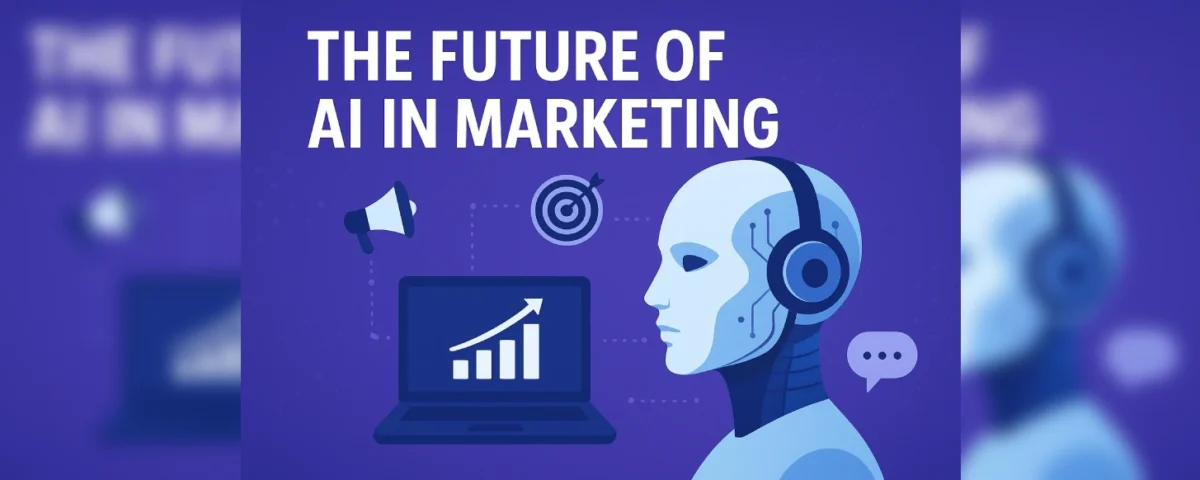The Future of AI in Marketing

Perplexity Paid vs. Free Features: Key Differences Explained
September 19, 2025
AI Keyword Generator—Smarter SEO Strategy
November 11, 2025The Future of AI in Marketing: Transforming the Way Brands Connect with Consumers
Artificial Intelligence (AI) has moved far beyond science fiction and into the heart of modern business strategies. In marketing, AI is not just a trend—it’s the driving force behind innovation, personalization, and performance. As technology continues to evolve, the future of AI in marketing promises to revolutionize how brands understand their audience, craft content, and deliver seamless customer experiences.
In this blog, we’ll explore how AI is shaping the future of marketing, its real-world applications, and why adopting AI-driven strategies will be key to business success in the coming years.
1. Understanding AI in Marketing
AI in marketing refers to the use of advanced algorithms, machine learning, and data analytics to automate, optimize, and personalize marketing efforts. From chatbots and recommendation engines to predictive analytics and content generation, AI allows businesses to make smarter, data-backed decisions that drive better engagement and conversions.
Instead of relying solely on traditional marketing methods, AI empowers marketers with real-time insights, enabling them to target the right audience with the right message at the perfect time.
2. Personalization: The Core of AI-Driven Marketing
In the digital era, personalization is no longer optional—it’s expected. Customers want brands to understand their preferences, anticipate their needs, and offer tailored solutions. AI makes this possible by analyzing massive datasets that include user behavior, demographics, and past interactions.
For example, Netflix’s recommendation system and Amazon’s “Customers Also Bought” feature are powered by AI algorithms that predict what users are likely to engage with next. This type of hyper-personalization will continue to dominate the marketing landscape, helping brands build stronger connections and loyalty.
In the future, AI will enable even more dynamic personalization—adapting not only to who the user is but also to their current context, mood, and location.
3. Predictive Analytics: Anticipating Customer Behavior
Predictive analytics is one of the most powerful AI tools in marketing. It uses historical data, trends, and machine learning models to forecast future behaviors. Marketers can use predictive insights to:
- Identify which leads are most likely to convert
- Forecast sales and demand
- Detect potential churn before it happens
- Optimize ad campaigns for maximum ROI
With the integration of AI-driven predictive analytics, businesses can shift from reactive marketing to proactive strategies—anticipating customer needs before they arise.
4. AI-Powered Content Creation and Optimization
Content is still king—but AI is rapidly becoming the kingmaker. Tools like ChatGPT, Jasper, and Copy.ai can create high-quality content in seconds, from blog posts and email campaigns to social media captions. Beyond creation, AI can also optimize content for SEO by analyzing top-performing keywords, trends, and audience preferences.
AI-driven content marketing tools help brands ensure their messages are not only relevant but also aligned with search engine algorithms. In the near future, AI will be capable of creating entire content ecosystems—generating, publishing, testing, and refining content based on user engagement data in real time.
5. Chatbots and Conversational Marketing
Conversational AI has redefined customer engagement. Chatbots powered by natural language processing (NLP) can now interact with customers 24/7, answering questions, guiding purchases, and offering personalized recommendations.
AI chatbots are becoming increasingly sophisticated, capable of understanding context, sentiment, and intent. This allows brands to deliver a seamless conversational experience that feels genuinely human.
In the future, chatbots will evolve into full-fledged virtual assistants that can manage complex tasks, handle voice-based interactions, and integrate across multiple channels—from websites and social platforms to voice assistants like Alexa or Google Assistant.
6. Smarter Advertising with AI
AI is transforming digital advertising by automating campaign management and optimizing ad performance in real time. Platforms like Google Ads and Meta Ads already use AI to manage bidding strategies, audience targeting, and ad placements.
With AI’s ability to process vast amounts of data, marketers can predict which ad creatives will perform best, allocate budgets efficiently, and eliminate wasted spending. Advanced AI models can even generate ad variations, test them simultaneously, and refine strategies automatically.
The future of advertising will rely heavily on AI-driven precision targeting—ensuring ads reach audiences that are not just interested but ready to act.
7. Visual and Voice Search: The Next Frontier
AI is changing how people search for information online. With the rise of visual and voice search, marketers need to adapt their strategies to remain visible in this evolving landscape.
AI technologies like Google Lens and voice assistants have made searching more intuitive. Instead of typing, users can now search with images or voice commands. This means businesses must optimize for conversational keywords and visual content.
In the future, integrating AI-powered search optimization will be critical for staying competitive—particularly as Generation Z and Alpha continue to favor these interactive search methods.
8. Data-Driven Decision Making
Data has always been the foundation of marketing, but AI amplifies its potential. With machine learning models, marketers can process complex datasets faster and uncover hidden insights that humans might overlook.
AI tools can segment audiences more accurately, identify trends, and recommend strategies based on real-time data. This helps brands make more informed decisions that are both strategic and customer-focused.
In the coming years, AI-powered analytics dashboards will become standard, giving marketers predictive intelligence and actionable insights at their fingertips.
9. Ethical AI and Data Privacy
As AI becomes more integrated into marketing, data privacy and ethics will take center stage. Consumers are increasingly aware of how their data is used, and brands must ensure transparency and compliance with regulations like GDPR.
The future of AI marketing will require a balance between personalization and privacy. Ethical AI practices—including bias-free algorithms and transparent data use—will be essential for maintaining consumer trust.
10. The Future Ahead: Human Creativity Meets Machine Intelligence
While AI automates and optimizes many marketing processes, it doesn’t replace human creativity—it enhances it. The most successful marketers of the future will be those who can leverage AI’s analytical power while maintaining a human touch in storytelling, empathy, and emotional connection.
The next phase of marketing evolution will be AI-human collaboration—where machines handle data-driven decisions, and humans focus on innovation and strategy.


